Digital Poster
Brain Tumors: Diffusion & Perfusion
ISMRM & ISMRT Annual Meeting & Exhibition • 10-15 May 2025 • Honolulu, Hawai'i

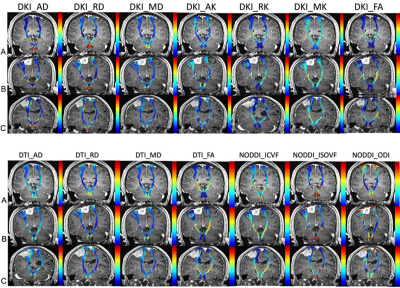 |
Computer Number: 113
2532. Correlation
Between the Corticospinal Tract abnormality and Muscle Weakness
in Patients with Meningiomas: An Advanced Diffusion MRI Study
L. Chen, Y. Zhao, R. Jiang, D. Zeng, J. Chen, J. Zhang, Y.
Xue, L. Lin
Department of Radiology, Fujian Medical University Union Hospital, NO.29 Xinquan Road, Fuzhou, 350001 Fujian, P. R. China, Fuzhou, China
Impact: The study presented advanced diffusion MRI can
effectively detect corticospinal tract abnormalities linked
to motor weakness in meningioma patients. These findings
highlight the potential of imaging metrics to improve
diagnosis and management of motor dysfunction, enhancing
patient outcomes.
|
|
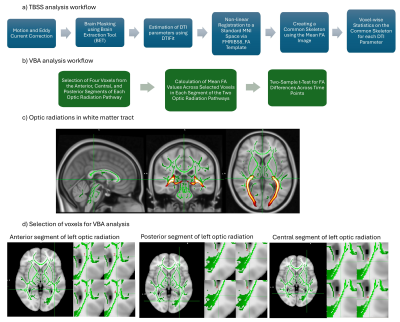 |
Computer Number: 114
2533. Effects
of Gamma Knife Radiosurgery on Optic Pathways in Sellar Tumor
Patients: Voxel-based and Tract-based DTI Analysis
B. Arikan, M. Yazol, E. Bhuiyan, O. Emmez, X. Zhou, Y. Oner,
M. Karaman
University of Illinois Chicago, Chicago, United States
Impact: Advanced DTI analysis with TBSS and VBA confirms
that GKRS preserves optic radiation integrity in sellar
tumor patients. Future studies can extend these methods to
assessing long-term radiation effects on neural pathways and
refining neuroprotective strategies in radiotherapy.
|
|
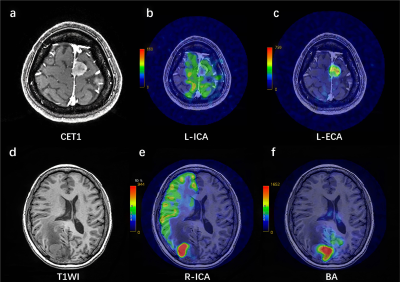 |
Computer Number: 115
2534. Impact
of Vascular Supply Variability on the Prognosis of Meningioma
Patients: A Retrospective Study based on Territory Arterial Spin
Labeling
B. Yin, Y. Zhu, X. Gu, M. Gao, X. Li, Y. Zhao, P-Y Wu, L.
Liu, Y. Lu
Huashan Hospital, Fudan University, Shanghai, China
Impact: T-ASL shows promise in comparing the prognosis
of meningiomas based on blood supply. Dizziness and headache
are the distinctive symptoms in meningiomas supplied by ICA
and ECA. Additionally, the prognosis may be worse for
meningiomas involving ICA supply.
|
|
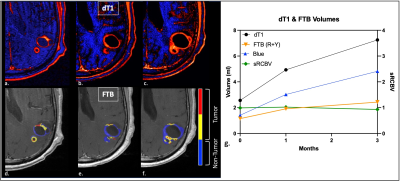 |
Computer Number: 116
2535. DSC-MRI
Fractional Tumor Burden (FTB) Maps: An Early Predictor of
Response to Tumor Treating Fields in Glioblastoma
K. Schmainda, M. Prah, J. Connelly
Medical College of Wisconsin, Milwaukee, United States
Impact: Use of perfusion-derived fractional tumor burden
(FTB), as an early indicator of response to Tumor Treating
Fields, overcomes current limitations with conventional MRI
that should substantially alter how these patients are
managed.
|
|
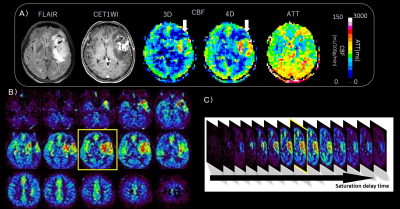 |
Computer Number: 117
2536. Improved
Visibility of Diffuse Gliomas using Multi-delay
Pseudo-continuous ASL with a Variable-TR Scheme
K. Yamashita, M. Obara, O. Togao, R. Mikayama, K. Kikuchi,
M. Kusunoki, T. Wada, C. Tokunaga, M. Van Cauteren, K.
Ishigami
Kyushu University, Fukuoka, Japan
Impact: The multi-delay PCASL with a variable-TR
technique facilitates the identification of increased blood
flow regions in diffuse gliomas at the optimal timing. New
insights related to dynamic parameters play a vital role in
the diagnosis and treating adult-type diffuse gliomas.
|
|
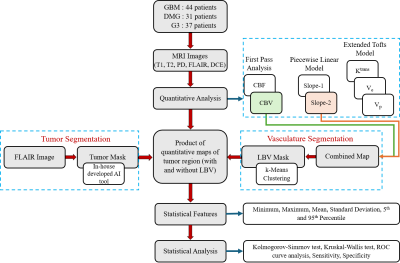 |
Computer Number: 118
2537. DCE-MRI
Based Differentiation of Glioblastomas, Diffused Midline
Gliomas, and Grade-3 Gliomas: Impact of Large Blood Vessel
Removal
A. Kesari, R. Gupta, A. Singh
Indian Institute of Technology Delhi, New Delhi, India
Impact: Proposed
approach based on quantitative DCE-MRI parameters after
removal of non-tumoral large vasculature provided enhanced
accuracy of differentiating among high grade gliomas, which
has potential in improving diagnostic precision and
treatment planning.
|
|
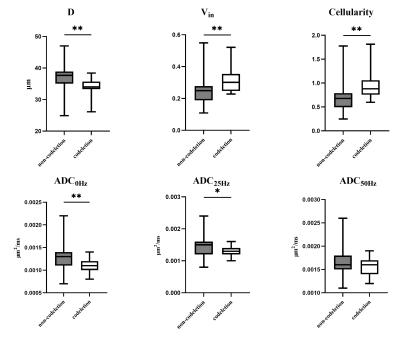 |
Computer Number: 119
2538. Td-dMRI
helps predict 1p/19q codeletion status in IDH-mutant gliomas
X. Zhang, P. Sun, J. Wang
Union Hospital, Tongji Medical College, Huazhong University of Science and Technology, Wuhan, China
Impact: Time-dependent diffusion-weighted imaging
provides a non-invasive approach to characterize
microstructural features, including cell size and density.
It shows promise in predicting the 1p/19q codeletion status
in IDH-mutant gliomas, potentially aiding clinicians in
selecting optimal treatment strategies and conducting
prognostic analyses.
|
|
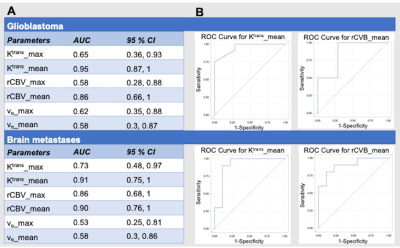 |
Computer Number: 120
2539. Combined
Dynamic Contrast-Enhanced and Dynamic Susceptibility-Contrast
MRI in Differentiating Treatment-related Effects from
Progression
J. Xiao, Y. Chen, S. Wang, S. Cen, F. Chow, D. Tran, J. Ye,
M. Shiroishi, G. Zada, E. Chang, Z. Fan
University of Southern California, Los Angeles, United States
Impact: Combined DCE and DSC demonstrated excellent
diagnostic accuracy in differentiating treatment-related
effects and brain tumor progression when an enlarged
enhancing lesion was first spotted on MRI. It could allow
physicians to early evaluate treatment response and make
decisions accordingly.
|
|
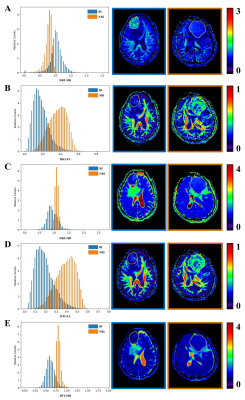 |
Computer Number: 121
2540. Preoperative
Prediction of Brain Invasion in Meningiomas: A Comparison of
Diffusion Kurtosis Imaging and Diffusion Tensor Imaging
L. Lin, D. Wei, S. Liu, Y. Song
Fujian Medical University Union Hospital, Fuzhou, China
Impact: Whole-tumour histogram analysis of diffusion
kurtosis imaging can accurately predict the brian invasion
of meningioma, which may facilitate personalized treatment
and prognostic assessment for patients with meningioma.
|
|
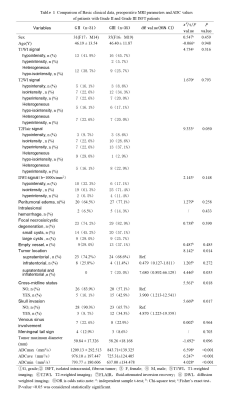 |
Computer Number: 122
2541. The
multivariate logistic regression model based on clinical
features and preoperative MRI characterization to the grading of
ISFT
Y. Ran, M. Zhu, J. Cheng, C. Liu
The First Affiliated Hospital of Zhengzhou University, Zhengzhou , China
Impact: A multivariate logistic regression analysis
model was constructed to diagnose ISFT grading, and it was
found that ADCmax and ADCave value could be used as
effective predictors, which would provide an important
reference for preoperative imaging grading of ISFT patients.
|
|
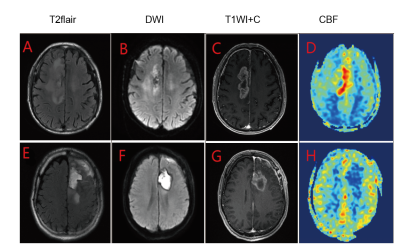 |
Computer Number: 123
2542. Differentiating
Recurrence from Pseudoprogression in High-Grade Gliomas Using
Three-dimensional Pseudo-Continuous Arterial Spin Labeling
P. Liu, J. Zhang, N. Zheng, W. Zhu
Department of Radiology, Tongji Hospital, Tongji Medical College,Huazhong University of Science and Technology, Wuhan, China., Wuhan City, China
Impact: 3D-pCASL and its radiomics can effectively
identify TR versus PsP in postoperative glioma patients
which is difficultly differentiated by conventional MRI
sequences,Integrating machine learning to further optimize
radiomic models could enhance diagnostic accuracy and
improve patient survival rates.
|
|
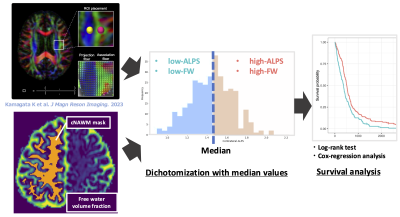 |
Computer Number: 124
2543. Contralateral
Neurofluid Dynamics Predict Survival in IDH Wild-type
Glioblastoma: A DTI-ALPS and Free Water Imaging Study
W. Uchida, A. Hagiwara, T. Ozawa, K. Takabayashi, C. Andica,
J. Kikuta, T. Maekawa, T. Akashi, A. Wada, K. Kamagata, O.
Akiyama, A. Kondo, S. Aoki
Juntendo University, Chiba, Japan
Impact:
Lower ALPS-index and higher free water volume fraction in contralateral normal-appearing white matter predict poor survival in glioblastoma patients. These non-invasive imaging biomarkers may help assess disease severity and monitor treatment response, potentially improving personalized therapeutic strategies in glioblastoma management. |
|
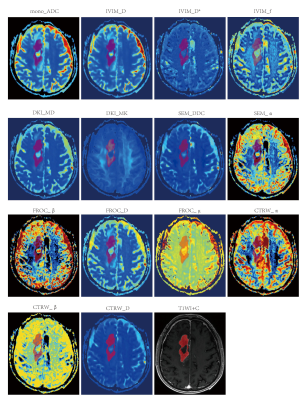 |
Computer Number: 125
2544. Differentiation
of Postoperative Recurrence and Pseudoprogression of Gliomas
Using Multi-b Value Diffusion-Weighted Imaging
J. Zhang, P. Liu, N. Zheng, W. Zhu
Department of Radiology, Tongji Hospital, Tongji Medical College,Huazhong University of Science and Technology, Wuhan, China., Wuhan City, China
Impact: This study employed various diffusion models to
conduct a preliminary analysis of the discriminative value
of multi-b-value DWI techniques in the postoperative
assessment of gliomas, providing a reference for the
selection of diffusion models in subsequent clinical
diagnosis and treatment.
|
|
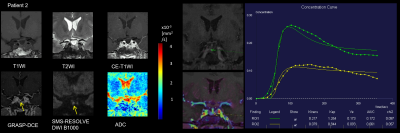 |
Computer Number: 126
2545. Diagnostic
Performance of GRASP DCE-MRI and SMS-RESOLVE DWI for
Postoperative Assessment of Pituitary Neuroendocrine Tumors
C. GUO, B. TAN, C. DAI, X. LIU, Y. JIANG, Z. WANG, Y. MENG,
H. ZHANG
The First Hospital of Jilin University, Changchun, China
Impact: This study highlights GRASP DCE-MRI and
SMS-RESOLVE DWI as advanced tools that improve the detection
and monitoring of postoperative residual PitNETs, providing
reliable non-contrast imaging options and potentially
guiding improved clinical decision-making.
|
|
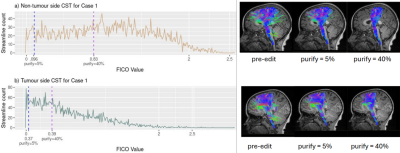 |
Computer Number: 127
2546. Improving
manual tractography by automating spurious streamline removal:
an application in paediatric tumour patients
S. Greenstein, S. Genc, J. Yang, D. Aydogan
Murdoch Children's Research Institute, Melbourne, Australia
Impact: Purifibre, a novel automated method for removing
false-positive streamlines, significantly reduces the time
needed for manual tract editing. This tool enhances the
feasibility of applying probabilistic tractography for
pre-surgical planning in tumour cases, especially when
pathology disrupts typical streamline structure.
|
|
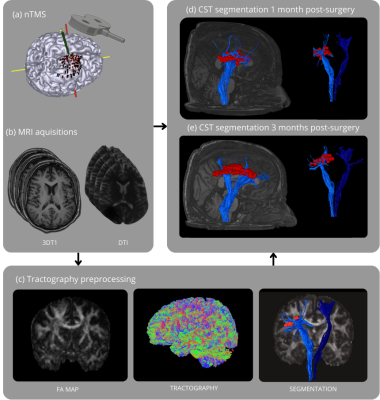 |
Computer Number: 128
2547. nTMS-Based
Tractography Assessment After Brain Tumor Resection:
Understanding the Neuroplasticity of the Motor Areas
H. Konell, L. dos Santos, A. Dias Polverini, L. Albuquerque,
E. Horiquini-Barbosa, F. Chavaglia, D. Grossi Marconi, S.
Kumar, D. Edwards, A. dos Santos, T. Edwards
Barretos Cancer Hospital, Barretos, Brazil
Impact: The results could impact brain tumor surgery and
rehabilitation, providing insights into post-surgical
recovery of motor function. Future research could explore
the mechanisms of neuroplasticity, guiding rehabilitation
strategies to optimize functional outcomes in patients.
|
The International Society for Magnetic Resonance in Medicine is accredited by the Accreditation Council for Continuing Medical Education to provide continuing medical education for physicians.